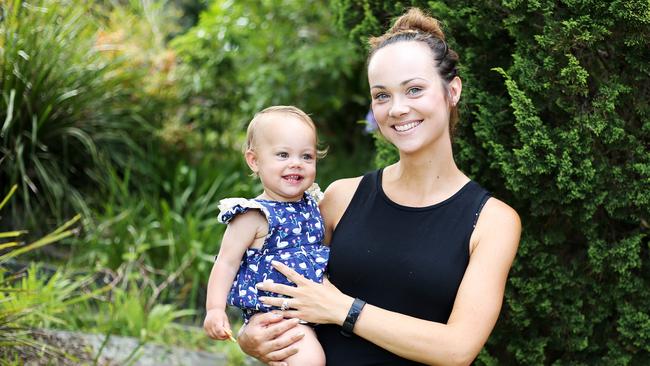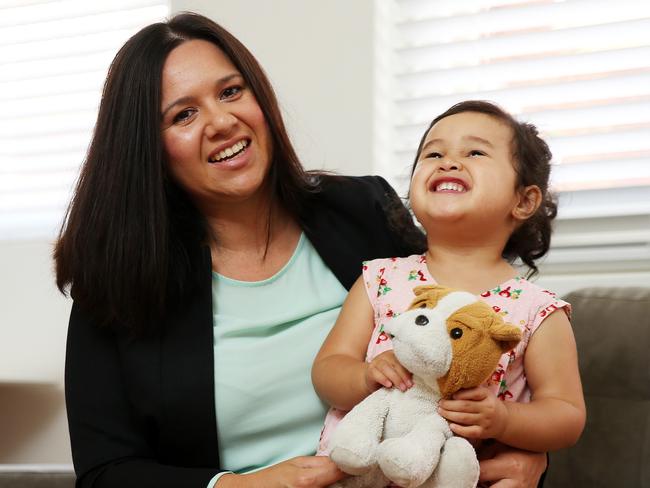Childcare costs higher than earnings for women who want to stay in careers
A GROWING number of Sydney women pay more for childcare than they earn — but they keep going for self-identity and mental stimulation.

NSW
Don't miss out on the headlines from NSW. Followed categories will be added to My News.
- Quarter of Sydney childcare centres fail quality standards test
- Childcare costs rise three times faster than rebates
A GROWING number of Sydney women pay more for childcare than they earn by working.
Yet they persevere for reasons including not wanting to be out of the workforce too long, mental stimulation and keeping their sense of identity.
Berowra Heights mum Polly Connolly has three children under age five and works two days a week at a children’s shoe shop despite the family’s household budget being $50 a month worse off, even after the childcare rebate. And that’s not including other expenses like travel.

Before she became a mum she had a career in finance.
“I do it because I guess I want to contribute to the household in some way but my three children are all under the age of five so they are still too young to be left in fulltime care,” Ms Connolly said.
“Going to work also gives me a break. I wanted to keep working because it gives me the chance to be somebody else for the day.”
Ms Connolly’s story is not a one-off.
Government data shows parents pay up to $165 a day in childcare fees on average in some Sydney suburbs, and not just in the inner city.
Hourly fees for long day-care rose 5.4 per cent in the past year, on average, across the country.
However the childcare benefit, a means-tested fee subsidy, grew just 1.7 per cent.
The childcare rebate has been capped at $7500 per child for eight years.
It’s not easy finding part-time work again, especially nowadays.
Western Sydney Women Founding Director Amanda Rose said she networked with a lot of working mums who lost money, broke even or only took away about $50 from their jobs when all expenses were taken into account.
“Childcare is such a massive cost to them but they also need a break and their children need to learn to socialise,” she said.
There was also a “fear factor” of staying out of the workforce too long, Ms Rose said.
“Women literally think if they have been out for a year, they’ve lost it ... but I find what I call post-mums are fantastic employees … they have exceptional time-management skills, they don’t waste a minute,” she said.
Australian National University Associate Professor Ben Phillips released research this year that showed when the marginal tax rate, the rebate cap and costs of childcare were taken into account, low-income mothers were losing money for the fourth and fifth day they attended work.
In “extreme” cases, some mums could even be worse off overall, he told The Saturday Telegraph.
Three years ago, Mt Druitt mum Tara Fitzpatrick was working in administration five days a week for $650.
She forked out $720 per week, after benefits, on childcare for her three kids, then aged two, three and four.
I do it because otherwise I would be housebound. I need my own life as well.
“It’s not easy finding part-time work again, especially nowadays,” she said.
Linda, a single mum in Penshurst, puts her daughter, Pyper, two, into childcare two days a week.
She is down $204 a fortnight as she is yet to make any money from her new business, Natural Therapy Jobs, which will be launched in February.
One fifth of Aussie women running businesses have a child under five, according to the ABS.
Linda made the choice to work for herself after she was demoted in her corporate job after returning from maternity leave.
“I was once a manager ... and then I came back from maternity leave and I had to report to the person I had trained up. I wasn’t using my skills,” she said.
“I do it because otherwise I would be housebound. I need my own life as well.
“I have to do something that keeps my brain ticking and keeps my skills up to date,” she said.
A lawyer who balanced her work with being a mother of four said she chose to keep working despite it being of little financial benefit early on in her career because it was a long-term investment.
The family hired a private in-home nanny because she couldn’t take the day off if one of the kids fell sick.
“I wanted to have a career and I wanted to have some capacity to support myself and my family.
“I wouldn’t have the earning capacity I have now,” she said.



